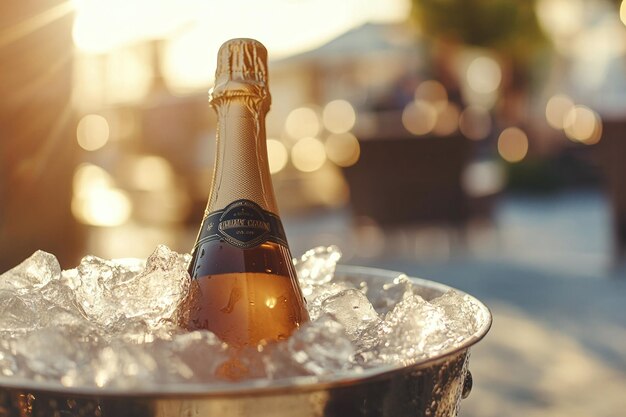How Long Can You Keep That Bottle of Champagne Unopened in the Refrigerator?
There's something about champagne that makes every occasion feel extraordinary, whether it's a wedding toast, a New Year's Eve celebration, or a quiet evening filled with reflection. However, an essential question for many is: How long can an unopened bottle of champagne last when stored in the refrigerator? This guide will dive into the storage considerations and help demystify this bubbling question.
🍾 Understanding Champagne's Composition
Champagne, a luxurious sparkling wine from the Champagne region in France, possesses a unique composition that plays a role in its shelf life. Carbonation, the bubbles in champagne, results from a specific method of fermentation that makes this drink both refreshing and celebratory. The complex balance of alcohol, sugars, and acidity also determines how long champagne retains its optimal flavor and effervescence.
Why Champagne is Unique
- Secondary Fermentation: This process is behind the characteristic bubbles and involves adding yeast and sugar to a sealed bottle, allowing carbon dioxide to dissolve into the liquid.
- Acidity: This is present in high levels, acting as a natural preservative.
- Wine Blend: Typically made from Pinot Noir, Pinot Meunier, and Chardonnay grapes, champagne's grape blend affects its aging properties.
🕰 The Shelf Life of Unopened Champagne
How long champagne lasts truly depends on several factors, including the type of champagne (vintage vs. non-vintage) and storage conditions. Let’s break down these factors:
Vintage vs. Non-Vintage Champagne
- Vintage Champagne: Made in particular years that yield exceptional grapes, it is often aged in the bottle for a longer period before release. This type can last 5 to 10 years unopened in proper conditions, such as a cool, dark place.
- Non-Vintage Champagne: Blended from grapes of multiple years, non-vintage options are designed for immediate enjoyment and typically last 3 to 4 years unopened.
🥶 Refrigeration and Your Champagne
Championing storage, the refrigerator is often hailed as a go-to spot. However, it’s not always the necessary solution for long-term champagne storage.
Pros and Cons of Refrigerator Storage
- Pros: Short-term storage (a few weeks) is convenient and maintains cool temperatures to keep champagne ready for unexpected celebrations.
- Cons: Extended refrigerator storage can lead to drying out corks, which compromises the seal, potentially leading to oxidation.
Ideal Conditions for Long-Term Storage
Even if you plan to eventually chill your champagne, it’s better to store these bottles horizontally in a dark, cool environment, ideally between 45°F and 65°F. This prevents the cork from drying by keeping it in contact with the liquid.
📜 Practical Tips for Storing Champagne
Ensuring your champagne stays fresh involves more than just tossing it into the fridge. Here are some practical, easy-to-follow tips:
- Avoid Temperature Fluctuations: Maintain a steady temperature in your storage area to keep carbonation intact and prevent quality loss.
- Store Bottles Horizontally: Protect the cork by storing bottles on their sides in a wine rack or cellar.
- Limited Light Exposure: Keep champagne away from sunlight and artificial light to avoid “lightstruck” wine, which impairs flavor.
- Frequent Chilling and Warming Should Be Avoided: Repeated temperature changes can agitate the dissolution of CO2, dampening its fizzy charm.
🍽 When to Open That Bottle?
Beyond knowing the theoretical lifespan of a bottle, opening champagne is also a matter of preference and occasion.
Indicators It Might Be Time
- If a special event is nearing and your bottle is approaching its recommended storage limit, it might be the perfect occasion to enjoy its delicate effervescence.
- For older vintages, practice caution—aged champagne can develop distinct flavors. When in doubt, a dedicated oenophile can help appraise its condition.
What if it Doesn't Taste "Right”?
Sometimes, despite best practices, champagne may not meet expectations. Here’s what to check:
- Cork Integrity: Check for signs of leakage or a damaged cork.
- Aroma and Taste: A slight vinegar or flat taste can indicate oxidation. While not dangerous, it might not be delightful.
✨ Champagne Storage Myths and Mistakes
- Myth: Constant Refrigeration is a Must: Many believe consistent refrigeration ensures longer freshness. Not so! Short-term chilling is fine, but excessive refrigeration over years is not essential for unopened bottles.
- Myth: All Champagne Gets Better With Age: Only some vintages, especially older, more premium versions, improve over time. Most non-vintage options are best enjoyed sooner than later.
- Mistake: Allowing Bottles to Freeze: Champagne should never be frozen, as this can cause the bottle to explode or, at best, affect its taste unfavorably.
🎉 Tips for Choosing Champagne for Storage
Are you planning to save a bottle for a future milestone? Here’s a simplified guide to selecting champagne fit for long-term storage:
Vintage Champagne Selection:
- Look for bottle age: Ensure its existing time spent in the cellar suits the duration you intend to store.
- Consider winery reputation: Some producers have a history of creating exceptional vintages that mature well.
Non-Vintage Champagne Selection:
- Evaluate freshness needs: Non-vintage options might be best enjoyed sooner, short storage is ideal.
- Purchase within 1 to 2 years of bottling for maximum freshness. Generally, the purchase date aligns with its “ideal consumption timeline.”
🔍 Key Takeaways
Here's a visually distinct summary of champagne storage tips and duration for easy reference:
Champagne at a Glance:
- 🥂 Vintage Champagne can last 5-10 years unopened in a cool, dark place.
- 🥂 Non-Vintage Champagne is best enjoyed within 3-4 years of purchase.
- 🗄 Refrigerator storage is fine for short term (weeks), but not ideal long-term due to cork drying risks.
- 🚫 Avoid temperature changes and direct light for optimal champagne longevity.
By understanding and applying these simple guidelines, you'll ensure that every bottle of champagne in your possession offers a taste experience as delightful as the celebration it accompanies. Whether you're storing it for years or popping it next week, the key is in informed and attentive care. Cheers to that!

